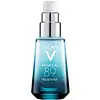What's inside
What's inside
 Key Ingredients
Key Ingredients

 Benefits
Benefits

 Concerns
Concerns

 Ingredients Side-by-side
Ingredients Side-by-side

Water
Skin ConditioningPropanediol
SolventTrehalose
HumectantBetaine
HumectantSodium Lactate
BufferingSodium Hyaluronate
HumectantHyaluronic Acid
HumectantEctoin
Skin ConditioningBiosaccharide Gum-1
HumectantHydroxyethylcellulose
Emulsion StabilisingXanthan Gum
EmulsifyingPolysorbate 20
EmulsifyingDisodium Phosphate
BufferingSodium Phosphate
BufferingDisodium EDTA
Phenoxyethanol
PreservativeEthylhexylglycerin
Skin ConditioningBenzyl Alcohol
PerfumingParfum
MaskingCI 42090
Cosmetic ColorantCI 17200
Cosmetic ColorantWater, Propanediol, Trehalose, Betaine, Sodium Lactate, Sodium Hyaluronate, Hyaluronic Acid, Ectoin, Biosaccharide Gum-1, Hydroxyethylcellulose, Xanthan Gum, Polysorbate 20, Disodium Phosphate, Sodium Phosphate, Disodium EDTA, Phenoxyethanol, Ethylhexylglycerin, Benzyl Alcohol, Parfum, CI 42090, CI 17200
 Reviews
Reviews

Ingredients Explained
These ingredients are found in both products.
Ingredients higher up in an ingredient list are typically present in a larger amount.
Biosaccharide Gum-1 is a sugar created by fermenting sorbitol (which usually comes from potato starch!). It is known for its soothing and moisturizing properties.
Manufacturer tests show this ingredient helped reduce irritation from lactic acid by almost half and kept skin hydrated long-term as a humectant
Beyond hydration, Biosaccharide Gum-1 gives formulas a silky, non-sticky feel.
This ingredient is gentle, versatile, and suitable for all skin types.
Fun fact: Similar sugars can be found naturally in fruits like apples and pears.
Learn more about Biosaccharide Gum-1Phenoxyethanol is a preservative that has germicide, antimicrobial, and aromatic properties. Studies show that phenoxyethanol can prevent microbial growth. By itself, it has a scent that is similar to that of a rose.
It's often used in formulations along with Caprylyl Glycol to preserve the shelf life of products.
Propanediol is an all-star ingredient. It softens, hydrates, and smooths the skin.
It’s often used to:
Propanediol is not likely to cause sensitivity and considered safe to use. It is derived from corn or petroleum with a clear color and no scent.
Learn more about PropanediolSodium Hyaluronate is hyaluronic acid's salt form. It is commonly derived from the sodium salt of hyaluronic acid.
Like hyaluronic acid, it is great at holding water and acts as a humectant. This makes it a great skin hydrating ingredient.
Sodium Hyaluronate is naturally occurring in our bodies and is mostly found in eye fluid and joints.
These are some other common types of Hyaluronic Acid:
Learn more about Sodium HyaluronateWater. It's the most common cosmetic ingredient of all. You'll usually see it at the top of ingredient lists, meaning that it makes up the largest part of the product.
So why is it so popular? Water most often acts as a solvent - this means that it helps dissolve other ingredients into the formulation.
You'll also recognize water as that liquid we all need to stay alive. If you see this, drink a glass of water. Stay hydrated!
Learn more about Water